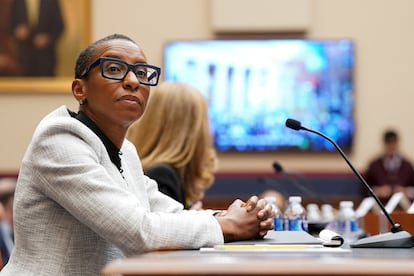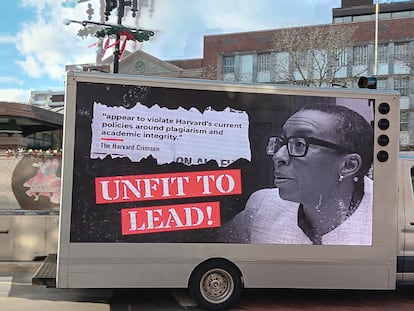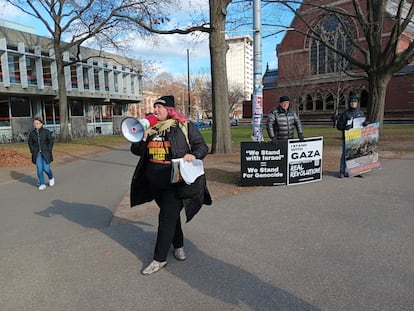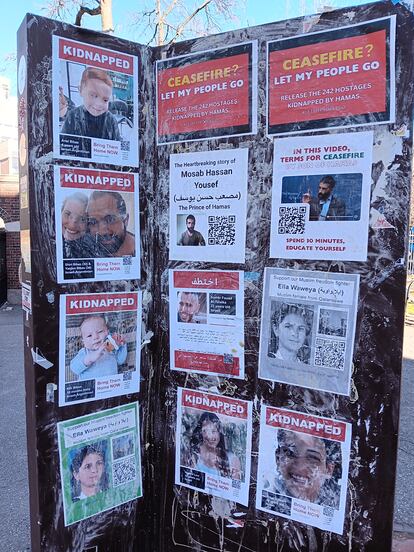Republicans lean into harassment of academic elite
The weaponization of accusations of anti-semitism on college campuses is fueling the controversy over the Gaza war. This is despite the fact that experts point out that this hate speech isn’t a new phenomenon… and that it’s more often attributed to the extreme right


On US college campuses — after years of affirmative action, identity and diversity politics and conservative offensive against free thought — have reached a boiling point, with accusations of anti-semitism being hurled against the universities. Trustees are withdrawing millions of dollars, presidents from three of the most well-known universities have faced noisy questioners in Congress (with one of them resigning afterwards), while political pressures and petitions are mounting.
The headlines have been piling up for weeks. However, as most of the dozen sources consulted for this report warn, anti-semitism in universities is not a consequence of the war on Gaza. Rather, it came about much earlier. And it’s not as widespread as it seems, nor is it being encouraged by pro-Palestinian groups. According to experts, it tends to be linked to the extreme-right.
Some sources recall that the worst anti-semitic attacks in the United States have been the work of white supremacists, such as the one in Charlottesville, Virginia, in 2017, encouraged by then-president Donald Trump and his acolytes, among them Republican Congresswoman Elise Stefanik (NY). 10 days ago, the ally of the former president attacked the leaders of the universities of Pennsylvania, Harvard and MIT in a congressional appearance. The first of them — Liz Magill — resigned three days after her testimony. Meanwhile, Claudine Gay of Harvard remains under scrutiny: advertising vans are stationed in front of her home or roaming around her campus. They display screens of her image and derogatory phrases, reminiscent of cruel times in American history.
The harassment of Gay and her companions — three women in the line of fire — is due, according to their detractors, to their failure to condemn demonstrations against Israel, which have frightened some students of the Jewish faith. The university presidents have also infuriated many donors, who are, effectively, the masters of American universities: last year, they contributed $59.5 billion to their operations. More than 80% of the donations came from 1% of the donors. One of them recently withdrew over $100 million from the University of Pennsylvania, which precipitated Magill’s fall.

Gay — the president of Harvard, which has a $50 billion annual budget — continues to resist pressure from donors, despite difficulties. The support of more than 700 professors on the faculty — many of them Jewish – and of the governing board has been of little use. Several donors — and quite a few congresspeople – continue to ask for her head.
Derek J. Penslar — professor of Jewish History and director of the Harvard Center for Jewish Studies — downplays the seriousness of the controversy. “The situation is not as serious as most of the American media has reported, although anti-semitism is a serious and growing problem in universities and in society as a whole. At Harvard, since the Hamas massacre of October 7, Jewish students have been subjected to merciless and hateful social media posts, insults and ostracism. There has only been one report of physical assault… whether or not it actually occurred is still being investigated. But there’s also no doubt that they have faced various forms of anti-semitism that have made them psychologically and emotionally uncomfortable,” Penslar notes.
The alleged call for the genocide of the Jews and the alleged inaction of the rectors denounced by Representative Stefanik is jarring… especially when the allegations are coming from someone who has supported conspiracy theories — such as the Great Replacement theory (advocated for by white supremacists) — or has applauded Trump’s derogatory remarks about the Jews.
Tweets posted about anti-semitism on campuses can give the mistaken impression that anti-semtisim in the US stems primarily from left-wing, pro-Palestinian activism. In fact, anti-semitic beliefs and actions are much more widespread on the far-right. Violent and deadly attacks against American Jews are planned and carried out by white nationalist extremists. Such was the case with Charlottesville in 2017, when then-President Trump shrugged and said that there was violence “on both sides,” regarding attacks by white supremacists on anti-racism protestors. Comments like these further emboldened the extreme-right. A year later, in 2018, a white supremacist killed 11 people at a Pittsburgh synagogue. This was the worst anti-semitic attack in US history.
Reached by email, author Dov Waxman adds: “While I’m concerned about the anti-semitic incidents that have taken place on some campuses since the outbreak of the war, I don’t think it’s accurate to say that [campuses] are hotbeds of anti-semitism. There certainly is [anti-semitism]... but its scope and severity are often exaggerated.” The echo chamber of the headlines — and the confluence of interests of the big media outlets with certain donors — can explain the volume of the debate.
Alejandro Baer — a professor and who is affiliated with the Center for Holocaust and Genocide Studies at the University of Minnesota — focuses on political instrumentalization. “Anti-semitism — and the way it is defined and combated — has become an important element in the American culture wars. Democrats and Republicans accuse each other of having anti-semites in their respective camps. Among Republicans, there are QAnon conspiracy theorists and white supremacists who, at the 2017 Charlottesville rally, shouted ‘Jews will not replace us.’ And, among the Democrats there are anti-Zionists who understand Hamas’ violence as legitimate resistance, or who question the Israeli state’s right to exist. Universities are Democratic strongholds and are being targeted by Republican attacks,” he affirms via email.

Republicans have found a nut to crack ahead of the 2024 elections, in their umpteenth culture war. This time, however, there are signs of victory, judging by Trump’s clear advantage in some key swing states. Also, this particular culture war is also supported by a few Democrats. Unlike other identity issues, the question of Israel is a red line that mobilizes the entire political spectrum. It does so in an emotional way, perhaps even in an existential one. But complicity with his Republican rivals has opened up a rift in Joe Biden’s party. This past week, the House of Representatives passed a bipartisan resolution condemning anti-semitism on campuses and calling for the resignation of Chancellor Gay and her MIT counterpart, Sally Kornbluth. The vote highlighted the stark Democratic divisions brought to light by the Gaza war: 84 Democrats — including progressive Jews — voted in favor of the resolution, compared to 125 Democrats who voted against it. All Republicans (except for one) supported the text. Far from remaining in the bubbles of liberal thought that are universities — with Harvard, a Democratic bastion, at the helm — the issue has jumped into the political arena to fuel the 2024 election campaign. It has left Biden depleted of strength and, increasingly, of support.
Autumn says goodbye to Harvard with a backdrop of sparse trees and sub-zero temperatures. This past week — with final exams and a vacation rush — it was difficult to find students willing to stop for a few minutes. María and Sissy — first-year students — were unaware of the controversy. “We’ve only seen lots of signs and posters that some [people] stick up and others tear down,” they say, alluding to a leaflet campaign demanding the release of Hamas hostages. “But, beyond that, we don’t know exactly what’s happening, or who’s right. It doesn’t seem like huge news to us, really.”
Jordana — a third-year History student— has a properly-informed opinion. “There hasn’t been a single incident [of anti-semitism], not one. Furthermore, only one side is talked about… the other side (Palestine) seems not to exist. The media — aligned with the angriest donors — has a lot to do with this. I think that Principal Gay is addressing the problem well and that the harassment to which she is being subjected to is unjustifiable.”
After being ratified in her position by Harvard’s governing board, unexpected accusations of plagiarism have loomed over Dr. Gay this week. Digital LED advertising vans bearing the photo of the first Black woman to lead Harvard — accompanied by disparaging messages — have been circulating the campus. Jordana denounces the bias of the controversy: “There’s a clear attempt to suppress any pro-Palestinian opinion. There’s no talk about the threats being made against Arab students, or about how their freedom of expression is restricted.” A Muslim student wearing a hijab — who asks not to be identified — agrees with her: “Of course, anti-semitism is a problem, without a doubt… but so is Islamophobia.”
This young woman claims that, since October 7, more episodes of anti-Muslim and anti-Arab hate have occurred on campus. “Harassment, harassment, insults… verbal, but very unpleasant, manifestations towards Arabs and Muslims. There are also hired vans going around Harvard bearing [digital] photos and personal information of students who [express pro-Palestine opinions]. The wife of a well-known professor was recorded insulting a student who was wearing a keffiyeh (Palestinian scarf).” The video has since gone viral and the names and surnames of the harasser and her spouse have been published by the university newspaper, The Harvard Crimson.
“It’s not a phenomenon that interferes with our daily lives, but it’s everywhere: in [coffeeshops], in the hallways… any student could tell you that they’re a witness to the debate, but many won’t dare to talk to you for fear of taking sides,” Jordana concludes. Neither does the institution itself — which hasn’t responded to a request for comment made by EL PAÍS — nor the Crimson.
Patrick — a British graduate student — doesn’t bother tearing down the posters calling for the release of the hostages. “They’ve glued them [to the poles], there’s no way to remove them. The controversy over anti-semitism on campus is pure theater: it’s just the interests of some millionaires upset by hearing things that they don’t like, [such as] the massacre being perpetrated against civilians in Gaza, or the fact that a ceasefire is necessary right now,” he explains.
Rabbi Getzel Davis — of Hillel Harvard, the local chapter of a Jewish university organization — hardly has a different opinion from the university: “The most important thing is that the culture changes and that we have an administration that names, denounces and tackles anti-semitism whenever and wherever it occurs… [it must] ensure that this campus is a safe learning environment for Jewish students and everyone else. We look forward to continuing to work with Chancellor Gay and other senior Harvard officials on educational programs and implementing policies to protect Jewish students.”

Near some dorms, three pro-Palestinian activists expressing their solidarity with Gaza warm up the icy morning with a megaphone. Without success, but also without risk: there are no adverse reactions, no complaints… only indifference. Rafael Kadaris — who introduces himself as “atheist born into a Jewish family” — takes the lead. A Californian with no connection to the campus, he’s a spokesperson for the marginal Revolutionary Communist Party of the USA. He defends the need for a revolution to blow up the system. The next day, in a central Harvard square, a group of individuals (mostly retired) form a human chain to ask for a ceasefire. None of them have any relationship with the university, either.
On October 19, in an interview with EL PAÍS, the philosopher Michael Walzer pointed out what he perceives to be an atmosphere of anti-semitism on campuses. This is limited — in his view — to leftist circles. Contacted again this past Wednesday to elaborate on the topic, he opined: “The emergence of anti-semitism after the Gaza war — especially on university campuses — isn’t exactly a surprise. Anti-Israel agitation has, for some time, been the main way for students to express their leftism, avoiding other issues that require the left’s attention. The shock of October 7 should have [put a check] on that leftism. Instead, for some — but not all — left-wing students, it became an occasion to demonstrate how committed they were to the Palestinian cause.”
Walzer — who is a professor emeritus at Princeton — maintains that the controversy surrounding the rectors (which he believes is justified) is an opportunity to correct mistakes and move forward. “Some university administrators and professors responded quickly and well, but many did not. Far-right Republicans — who have often played on anti-semitic themes — saw a populist opportunity to go after the academic elite. Hence the hearings [in Congress] and the harassment of the three rectors, who responded badly because they followed the advice of their lawyers and never spoke from the heart, which was what the moment required. I think things are going to get better now,” Walzer concludes.
Identity, diversity and inclusion: where do Jews fit in?
Alejandro Baer – who denounces the seriousness of the phenomenon of anti-semitism – places the current controversy and the complaints of insecurity and harassment of Jewish students in the context of so-called affirmative action in American universities. “Affirmative action and identity politics have generated a perverse effect that especially affects Jewish minorities on campuses. Diversity and inclusion plans – and the critical race studies on which they are based – understand American society in binary terms of oppressor-oppressed, or White-BIPOC. If you are in a victim group, then you receive special protection… and, if you’re in an oppressor group, then it’s assumed that you cannot suffer discrimination or injustice in the same way. Jews don’t fit into either category, but they’re still assigned to the white and oppressive group.”
Baer emphasizes that it doesn’t matter whether Jews are targets of white supremacism, or, as now, whether Israelis are the targets of pro-Palestinian protesters: they will never be seen as victims. “This represents an erasure and a denial of their identities and their experiences of persecution and discrimination. Paradoxically, in the name of this very poorly-focused anti-racism, an anti-semitic stereotype is also perpetuated: ‘Jew’ equals ‘power.’”
After the Hamas attack that sparked the assault on Gaza, Baer opines that “we see a projection of this simplistic framework that is blind to its anti-semitic implications. We have seen it in the campus demonstrations, in which the suffering of the oppressor was ignored. Jewish [and non-Jewish students] justified and even celebrated the violence of [a group of] oppressed Palestinians. Did no one stop to think that some students, teachers and staff of Jewish origin were going to feel attacked?”
Sign up for our weekly newsletter to get more English-language news coverage from EL PAÍS USA Edition
Tu suscripción se está usando en otro dispositivo
¿Quieres añadir otro usuario a tu suscripción?
Si continúas leyendo en este dispositivo, no se podrá leer en el otro.
FlechaTu suscripción se está usando en otro dispositivo y solo puedes acceder a EL PAÍS desde un dispositivo a la vez.
Si quieres compartir tu cuenta, cambia tu suscripción a la modalidad Premium, así podrás añadir otro usuario. Cada uno accederá con su propia cuenta de email, lo que os permitirá personalizar vuestra experiencia en EL PAÍS.
¿Tienes una suscripción de empresa? Accede aquí para contratar más cuentas.
En el caso de no saber quién está usando tu cuenta, te recomendamos cambiar tu contraseña aquí.
Si decides continuar compartiendo tu cuenta, este mensaje se mostrará en tu dispositivo y en el de la otra persona que está usando tu cuenta de forma indefinida, afectando a tu experiencia de lectura. Puedes consultar aquí los términos y condiciones de la suscripción digital.








































